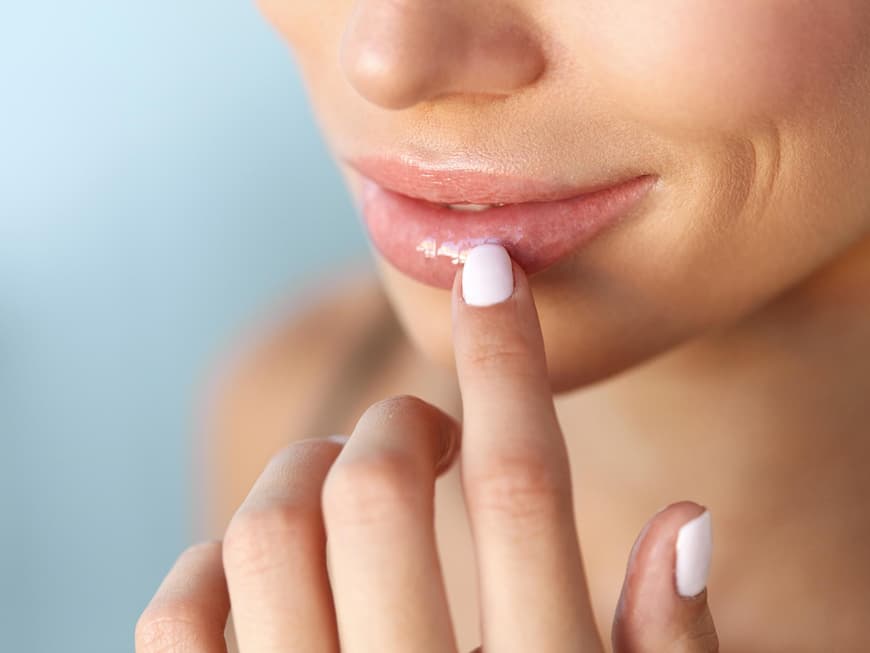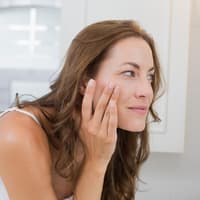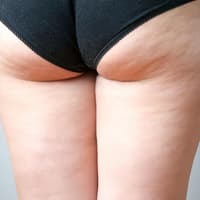
Why are dry lips so common?
The most important reason why the lips are particularly frequently affected by dryness lies in their structure. In contrast to other areas of skin, the lips have very few sebaceous glands with the body's own fat deposits. Your body can therefore only compensate for fluid and fat loss with difficulty, so that the slightest disturbance has an immediate effect on the lips.
Dry lips can therefore be caused by a variety of external and internal influences:
- Dry lips are particularly well-known and widespread in winter, when the air is very dry and you are also often in heated rooms with low humidity. Just like on hot summer days, when the air can also be very dry, the lips lack an external supply of moisture and dry out.
- Another external factor that can lead to dry lips is cosmetics. Conventional lipsticks without moisturizing ingredients, when used frequently, have the opposite effect of removing moisture from the lips.
- Licking your lips, which is often done intuitively, can also contribute to drying out your lips. If you moisturize your lips in this way, you may initially feel less tension, but you will have to contend with even drier lips later on. When the saliva on your lips evaporates, it draws even more moisture from the skin.
- In addition to external influences on the sensitive moisture balance of the lips, internal causes must also be taken into account. For example, an overall inadequate intake of fluids has a particularly damaging effect on your lips. In addition, an unbalanced diet that lacks important vitamins and minerals, stress or various infections can also trigger dry lips.
- A lack of vitamins and trace elements can also lead to dry lips. If vitamin B2, zinc or iron are lacking, the oral mucosa can become inflamed, the corners of the mouth can become cracked and cause a burning sensation. Vitamin B2 is found in dairy products and fish, for example, but also in vegetables such as broccoli, asparagus and spinach. Zinc and iron are found in pulses, oatmeal and pumpkin seeds, among other things, and there is also a lot of iron in offal such as liver. If you eat a varied diet, there is no risk of nutrient deficiency. Caution: A vitamin B2 deficiency often affects vegetarians and vegans, as the vitamin is mainly found in meat, fish and milk. Avoid an unbalanced diet to prevent deficiency symptoms.
- Thewrong diet can cause certain fungi to spread on the lips and dry out the skin completely. Make sure you eat a varied diet rich in vitamins and ask your dermatologist to prescribe an ointment to combat the infestation.
- People who eat very salty foods are also more likely to suffer from dry lips - direct salt, for example on snacks such as peanuts or salted pretzels, makes the lips dry and chapped if eaten frequently.
- Many people also cannot tolerate some types of fruit, such as pineapple or kiwis. Citric acid can also dry out the lips and cause them to burn.
How can dry lips be treated effectively?
Based on the causes of dry, chapped and cracked lips, a simple principle for treatment can be derived: The lips must be moisturized again. A first important step and at the same time a long-term measure to prevent dry lips is therefore sufficient fluid intake. Depending on the time of year and your level of activity, you should drink between 1.5 and 3 liters a day to ensure that your body, and therefore your lips, are sufficiently hydrated.
But what specifically helps if, for example, you wake up in the morning with unpleasantly dry lips? Various home remedies and products from the pharmacy or drugstore can be used to moisturize your lips in the short term. A traditional classic home remedy for this problem is honey. Simply massage it into your lips and leave it on for at least 10 minutes. Important: After the application time, you should not lick the honey off, but instead dab it off carefully. Licking it off would otherwise dry out the lips. Other tried and tested home remedies for treatment include aloe vera, Vaseline, cocoa butter, olive oil or marigold ointment. In addition to their moisturizing properties, all of these products also have other ingredients that have a moisturizing or antibacterial effect.
If you would like to use products from the pharmacy or drugstore to treat your lips when you are out and about, for example, you can choose from a wide range of products. High-quality lip balms, lip balms or lip creams provide your lips with lasting moisture and lipids. However, care should be taken when choosing a suitable lip balm: Some products available in this country contain potentially harmful substances such as mineral oils. If, on the other hand, you opt for a lip balm with only natural ingredients, you can be sure that no harmful substances get onto your lips.
Zinc is particularly effective: you can use a zinc ointment to prevent the sometimes painful cracks in the corners of the mouth. Special creams with the active ingredients dexpanthenol, zinc or witch hazel are suitable for treating lips that are already damaged.
Effectively prevent dry lips with the right behavior and an extra portion of care
The most important preventative measure against dry lips has already been mentioned: Drinking enough is hugely important to provide your lips with the moisture they need. You can also increase the humidity in rooms with dry air by using bowls of water, for example, to prevent them from drying out. If you would like to treat your lips to additional care, an occasional lip scrub in combination with a lip mask is a good idea. The beauty industry has also recognized this potential. You can buy these ready-mixed in the drugstore or make them yourself. All-purpose creams such as Nivea Creme quickly fulfill their purpose - however, lip balms are preferable due to their special texture and properties, especially as they are also visually transparent.
We can also get chapped and dry lips in summer - they are caused by the sun's rays on the one hand and by salt and chlorinated water when swimming on the other. Therefore, use appropriate lip care with a sun protection factor during the summer months to keep your lips supple. Avoid perfumed products!
Tip: If you don't want to go without lipstick despite dry lips, you should use lipsticks with moisturizing ingredients such as aloe vera, shea butter or beeswax.
What to do with chapped corners of the mouth?
Cracked corners of the mouth not only look unattractive, they also usually hurt quite a lot. There are many causes of chapped corners of the mouth. Sometimes the skin is simply overstretched, for example in winter when it is cold, after eating acidic or salty foods or after a cold. Or it is simply not elastic enough. Unfortunately, the cracked areas on the lips usually heal slowly, because when you yawn or brush your teeth, they quickly tear again.
However, you can treat the chapped areas well with lip balm or ointment, so that they should heal after a few days. However, if the problem keeps recurring and even care does not help, you should see a doctor. They can take a closer look at the cracks, examine them and make a diagnosis.
Sometimes there can be more to cracked corners of the mouth, for example iron deficiency, skin diseases, infections, autoimmune diseases or diabetes mellitus.
DIY scrub for supple lips
You can easily make your own lip scrub at home for soft lips. All you need is olive oil, honey and brown sugar.
Mix a tablespoon of honey with 3 tablespoons of brown sugar and a tablespoon of olive oil in a small container. The sugar should not dissolve as it serves as an exfoliant. Apply the mixture to the lips and massage in gently. Then rinse well with clean water and apply a rich lip balm.
Popular lip care on Amazon:
Natural lip care from Burt's Bees for approx. 3 euros
Lip care from Weleda with natural sun protection for approx. 3.45 euros
Hydro lip care from Kneipp for approx. 4.65 euros.
Tip for vegans: The "Nø kiss today lip balm" is 100% vegan and provides plenty of moisture with coconut oil and panthenol, for approx. 6 euros.
Date: 28.10.2020






